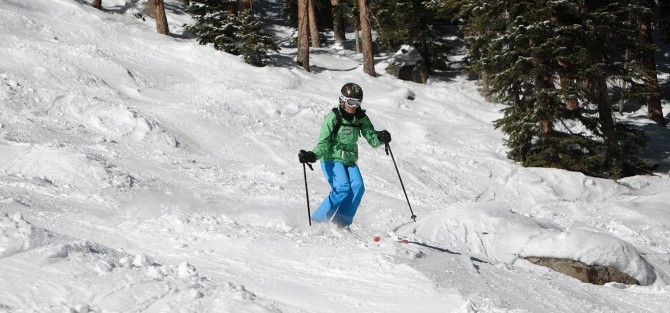
Whether you're a skier or snowboarder, you need the right gear to stay warm and dry on your outdoor adventures. There are plenty of choices. You will find the right jacket for you, whether it's super-breathable or affordable in 3-in-1 design.
Ski jackets should be light enough to withstand the elements and not weigh you down. It should be easy to pack away in a backpack, have plenty of storage for goggles and other essentials, and fit comfortably with a base layer beneath.
If you're a backcountry skier who spends much of his or her time off-piste, you'll need a jacket with higher breathability and waterproof ratings for conditions that can be as unpredictable as they are extreme. We prefer to use ski-specific designs by brands such as Patagonia and Arc'teryx, but there are many other options on the market that meet these standards.
Fjallraven's Keb Eco-Shell, which has a 10k/10k waterproof rating as well as an impressive level breathability, is a highly regarded model. It also has a helmet-compatible hood, sleek Velcro cuffs, and a wide range of stylish colorways to choose from.

Another great choice for backcountry skiers is the Rab Khroma Kinetic, a ski jacket designed for multi-day trips. The jacket is a tough, durable hardshell that weighs in at a mere 1 pound 3.8 ounces. It also features large front pockets and a helmet-compatible hood.
The Odin and Triolet are a bit more expensive, but the value is well-worth it. It boasts a Gore-Tex membrane with water-resistant zippers for maximum comfort and a helmet-compatible headgear.
Patagonia is the most well-known brand on the market. They make a wide range of jackets that can be used for many different activities. They are available for both women and men in a range sizes and colors.
Many of their insulated jackets, like the Object and Powder Town above, can also be worn as non-insulated outerwear. These jackets are versatile and can be used for all kinds of purposes.
To find the perfect ski jacket for you, consider what features are most important to your needs. Compare the different options side-by-side to see which one fits best. It is important to measure yourself and then compare your measurements with the size charts provided by each manufacturer.

Also, ensure you check the return and exchange policies before making your final decision. Every skier's body is different.
A woman who weighs in at least 125lbs might struggle to find the right size ski jacket for her. You will want a model that fits her well and is slim enough to accommodate a layer of base or midlayer.
A relaxed shell may be a better option for those who want a more comfortable fit. Most ski jackets are equipped with a removable, or fixed, hood. Fixed hoods offer more coverage for skiing, while removable hoods can be used to protect your skin from the sun or for snowboarding.
FAQ
What should you take on vacation?
It is important to plan what you will do during your vacation. Not just packing clothes. Consider where you're going and how much time you'll be staying there.
Consider what type of activities you'd like to take part in. For instance, if you travel to exotic places, you may consider diving. If you are planning to stay somewhere longer, then you might want to take part in local festivals or events.
If you have any health issues, then it is important that you tell the people who will be looking after you so they can plan accordingly.
What snacks can I take on a plane?
You can choose from many types of snacks when you fly. You may want to consider bringing along any food items that you know you enjoy eating while traveling.
If you love chocolate, for example, you might want some chocolates and other treats like biscuits and crisps.
If you're looking for something savory, perhaps you could try packing some cheese or crackers.
You should also consider what kind of drinks you would like to have on board. Perhaps you'd prefer something cold or hot?
You can bring any type of snack or beverage, but make sure you pack them securely.
This will ensure that your belongings are safe during transport.
What size luggage should I carry?
The length of your trip will determine how much luggage you need. If you are traveling by plane, you only need hand baggage, usually less than 20kg. For a bus or train ride, however, you will require more space.
When you arrive at the airport, you will be given a form to fill out with details of your flight. This form will contain information about your flight, such as the weight and assistance required when you check them in.
Before you leave for work, make sure to check it. If you don’t check it, you might end up waiting hours for everyone else to do so.
Because you never know what could happen, it is better to travel light. It is possible to lose your bag and not have something to wear.
Statistics
- No Checked Bags: No Alcoholic beverages with more than 70% alcohol (over 140 proof), including grain alcohol and 151 proof rum. (tsa.gov)
- Pack sweaters, jackets, and underwear in reusable compression bags creating up to 75% more space in your luggage. (wikihow.com)
- That's an 18% jump from 2019, the previous record year. (travelandleisure.com)
- They're also likely to offer babysitting services, in case you'd like to have dinner one night after 7 p.m. (travelandleisure.com)
- According to Maori legends, this park holds 14 fjords that were all carved by a giant stonemason with an adze. (busytourist.com)
External Links
How To
What are the best travel tips to beginners?
Traveling is an exciting experience, but there are many pitfalls you need to avoid if you want to have a safe and enjoyable trip.
Here are some simple tips to help you plan your next holiday.
-
Book early. The price of a booking is lower if it's made in advance. You'll also save money by avoiding last-minute deals offered by hotels and airlines.
-
Stay-at-budget accommodations. Cheap hotels are more affordable. These hotels are often located close to shopping and public transportation.
-
Don't overpack. Pack light. Make sure you have enough space for souvenirs and other gifts. Wear clothes that fit well, and don't wrinkle easily.
-
Use common sense. Do not walk alone if you're travelling solo. Avoid unsavory neighborhoods and areas where crime is rampant.
-
Take precautions against theft. Keep valuables out of sight. You should never leave anything valuable at home when you go swimming.
-
Be careful with cash. Tourists are often targeted by thieves in foreign cities. Keep your money safe and use ATMs only in banks or secured locations.
-
Be familiar with your surroundings. Prior to booking a room in a hotel, make sure you understand how public transport works. Find out about tourist attractions, restaurants, and other sights.
-
Read up on safety. Learn about local laws, customs, and culture before you arrive.
-
Have fun! No matter what happens, enjoy yourself. It's worth it.